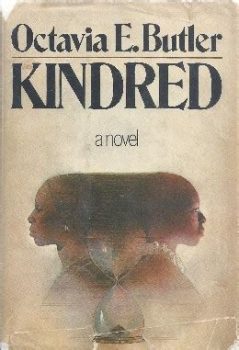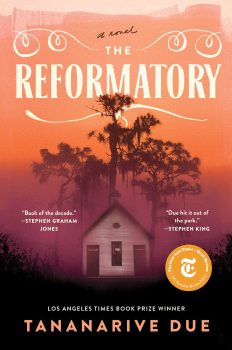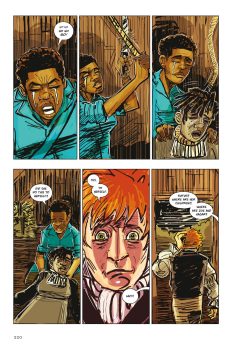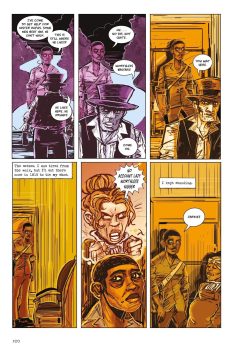The Great Escapes: James, Kindred, The Reformatory by Percival Everett, Octavia Butler, and Tananarive Due
James (Doubleday, March 19, 2024), Kindred (Doubleday,
July 1979), and The Reformatory (S&S/Saga Press, October 31, 2023
Percival Everett’s James is receiving a lot of well-deserved critical praise. As the title indicates (and the choice of the formal name a key trope), this reimagining of The Adventures of Huckleberry Finn elevates the escaped slave Jim from supporting stereotypical character to leading man status. Fearing he is about to be sold by his owner and separated from his family, James becomes a runaway not just for his own sake, but to find a way to free his wife and daughter. Along the way, he meets Huck who has just faked his death to escape an abusive father. So far we’re close to Twain’s original, and while Everett retains some events, the perspective shifts to focus on James’s journey towards safety and dignity.
As with many of Everett’s novels, James is a satire of white perceptions of Blacks, reinventing James as highly literate and articulate. In an ironic reversal of enslaver laws that prohibit educating slaves, all Blacks are well-spoken amongst themselves and only resort to uneducated and subservient slang when in presence of their white oppressors. James calls it a “slave filter”: “White folks expect us to sound a certain way and it can only help if we don’t disappoint them. The only ones who suffer when they are made to feel inferior is us.”
Highly recommended, as is just about anything in the Everett catalog.
Kindred by Octavia Butler, first published in 1979, describes a different kind of journey, but many of the same themes as James. I just got around to reading it as “homework” before watching the Hulu series based on it (which I’ve yet to get around to viewing). Kindred was also adapted by John Jennings and Damian Duffy into a graphic novel. A #1 New York Times bestseller, it was a 2017 Eisner Award winner, one of the most prestigious industry recognitions, sort of the Academy Award for graphic novel/comics.
The novel is a first-person account by Dana, a Black writer who periodically somehow or another gets transported from Los Angeles in 1976 (back when Jimmy Carter was president and the American centennial was celebrated) to antebellum Maryland expressly to rescue Rufus, son of a plantation slave-owner, from life threatening events occurring from his childhood through young adulthood. Why is Dana compelled all these times to save Rufus, whose character flaws reflect both the era and those of his repellant father? Because Dana is a descendent of a daughter fathered by Rufus with his slave concubine Alice in a further timeline. Should Rufus die before the child is born, Dana would not exist. Hence the title.
It’s an interesting conundrum. If you were somehow transported to the past to ensure your future birth, you are trapped in a situation where circumstances compel certain actions, otherwise you risk non-existence. This is not just a philosophical question, the sort of “what-if” contemplation typical of science fiction novels and undergraduate pot smoking. Rather, it is a metaphor for the condition of slavery — trapped in a situation where you have no choice, or if you choose not to accept it, risk obliteration.
Butler said she once envisioned the protagonist as male, but then realized an intelligent Black man would be too much of a threat to white slaveowners. Dana’s intelligence is considered a curiosity, but, like the Blacks in James, she has to be careful not to be too smart. Nor does her intelligence save her from savage treatment; at one point she is whipped for teaching a slave boy how to read.
Dana pops back and forth in time at various points in the past whenever necessary to rescue Rufus. Back in her own time, Dana is married to another writer, Kevin, who is white. Their interracial marriage has estranged both of them from their families, ironical given that Dana’s maternal ancestor Hagar is a “child of the plantation,” a euphemism for the offspring between a white master and enslaved Black. Thus Dana’s family is of mixed race whether they know it or not. On one occasion, Kevin is also transported back in time with Dana, where he assumes a “cover” as her owner. This is perhaps additional ironical commentary on the inequalities of traditional marriage where the man historically is the controlling authority.
Dana goes back to her own present time after Hagar is born. Alice tries unsuccessfully to run away, and as retribution Rufus lies that he has sold their children (they are actually staying with his aunt). Out of despair, Alice hangs herself, the last resort for escape. Because of his affection (though weirdly filtered via a sense of ownership and dominance) Rufus attempts suicide, prompting Dana’s return, and back into the condition of slavery, from her present on the very day, paradoxically enough, that is the Fourth of July celebration of freedom.
Because of Dana’s resemblance to Alice, not surprisingly given her ancestry, Rufus sees her as a substitute companion. Unfortunately for Rufus, now that her ancestor has been born and legacy assured, Dana is no longer obligated to preserve Rufus’s life. As in James, white folks in Kindred continually underestimate enslaved Blacks, with disastrous consequences.
Although her great uncle died in Jim Crow Florida at the Dozier School for Boys featured in her novel The Reformatory, Tananarive Due emphasizes the characters are not real people and the narrative entirely fictitious (for one thing, there are ghosts). But her depiction of the abuse that takes place is far from imaginary; indeed Florida recently announced a $20 million program to provide financial restitution to former “students” at the Dozier school between 1940 and 1975 who suffered mental, physical, or sexual abuse. You are likely to find The Reformatory in a bookstore’s Horror section; the horror, however, is not about supernatural entities (though there are those), but how human beings treat helpless people as somehow inferior and deserving of punishment.
Here again we have the themes of family bonds, the breaking of those bonds, and oppression of the powerless. Robert Stephens is the son of an agitator (meaning a Black man who advocated for basic human rights denied in the segregated South) fled to Chicago. Robert defends his sister, Gloria, from the advances of a privileged white boy and is consequently remanded to the Dozier School for his “assault.” He is subject to abuse not only by the white school superintendent Fenton Haddock and his underlings, but also his fellow inmates. Robert is also visited by the ghosts of former child inmates, the victims of a fire that took place at the school 30 years earlier. The fire was not accidental and Haddock is involved.
Robert’s ability to see the ghosts, called haints, makes him useful to Haddock. The superintendent wants Robert’s help to hunt down the haints and rid himself and the school of their hauntings. Haddock promises Robert an early release for this task (though he has no intention of doing so), but Robert doesn’t want to hurt the haints. Meanwhile, one of the haints enlists Robert in a plan to obtain evidence of Haddock’s longstanding abuse of the students. Placing Robert in the old rock and a hard place type situation. The only option is escape.
After a failed attempt to get justice for Robert through legal recourse, a tough task whenever involving a young Black male in the apartheid South, sister Gloria along with his aunt Mia Lottie hatch an escape plan. Read the last few chapters describing Robert’s escape, and his pursuit by Haddock and his men, late at night at your peril. No matter how tired you are, you can’t help but keep turning the pages to find out what happens next.
While the characters in James, Kindred, and The Reformatory journey towards escape, we readers live in times where the journey is far from over.
David Soyka is one of the founding bloggers at Black Gate. He’s written over 200 articles for us since 2008. His most recent was a review of The Ministry of Time by Kaliane Bradley.







[…] New article up on Blackgate. The Great Escapes: James, Kindred, The Reformatory. […]
I was in my local indie bookshop just yesterday. They were sold out of “James,” but had at least six other Everett titles. Your article has cemented his position as my next author to explore.